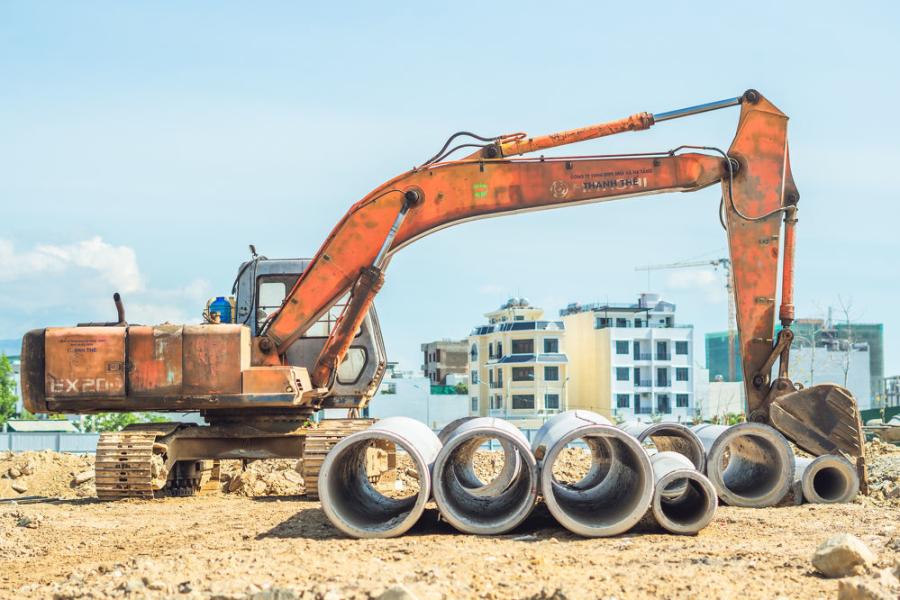Contractors are carefully watching trends in risk coverage during the pandemic. Top of mind are COVID-19 privacy and liability employment issues, how to present as a best-in-class risk to underwriters, worker’s compensation eligibility, claims and coverage.
As construction contractors work through the coronavirus pandemic, many are keeping an eye on the pandemic's effect on their risk management policies. The basic question: What will COVID's impact be on insurance? Get ahead of the curve now to avoid a hitch in commercial coverage next year.
The North American Excavation Shoring Association (NAXSA) notes that while historical losses led to current insurance price increases and reduced limits, a potential industry correction due to COVID-19 may be ahead.
The association warns members that insurance carriers will have to decide how much more risk they are willing to take on and how they are going to reduce their own exposure.
NAXSA notes that "reinsurance carriers have raised their rates across the board in anticipation of weaker carriers defaulting and pinching healthy carriers even more."
Blake Dickens, commercial lines producer and partner of HUB International Mid-South/Harris, Madden & Powell, Chicago, Ill., looks at four ways commercial insurance is affected:
- The evolving role of the broker. "Our customers are looking to their broker for advice more than price these days," wrote Dickens in a NAXSA article. "We are spending more time on consultative services than ever before."
He said topics most important to customers include COVID-19 privacy and liability employment issues, how to present as a best-in-class risk to underwriters, worker's compensation eligibility, claims and coverage.
"It has never been more important to partner with a broker that specializes in your industry, with risk services capabilities and strong carrier relationships," he advised.
- Increased scrutiny from underwriters. Underwriters are inquiring about every renewal, wrote Dickens. "Before taking risk on, underwriters want to know your business' pandemic response."
What is your business' level of exposure with COVID? What are you doing to mitigate it?
"Underwriters will want to know that your business is healthy financially before writing new coverage or even renewing an existing policy," he said.
- COVID coverage is being addressed. Most COVID business interruption and property claims are denied based on the inability to prove COVID caused physical loss or damage.
"Moving forward, most policies will have very specific language excluding pandemic coverage with COVID coverage most likely cited as well," wrote Dickens.
Where coverage is granted, it will be with specific sub limits and the customer will elect to "buy up," he said. "There is also potential for a federal ‘backstop' to address the concern at a catastrophic level."
- Businesses need to think profit and loss management. There is a good chance COVID-19 will further impact insurance costs, said Dickens.
"Prepare now. Look at every line item of your business' profit and loss margins to see what can be redirected," he suggested. "Have conversations around business strategy and maintain a conservative outlook on spending, while planning for higher insurance rates this year and in the immediate future."
Dickens said that the question still lingers: When will COVID-19 exposure catch up to the market?
He is blunt in his assessment: "The answer is unknown."
As 2021 unfolds, "carriers, brokers and business owners alike will remain watchful for changes in exposure and its resulting effect on the commercial insurance market," he added.
Getting Ahead of the Curve
Times are unprecedented, and that has meant significant work disruption for construction contractors across the country.
Project shut-downs and suspensions, supply-chain delays, financing term changes and tossed procurement timetables are other issues contractors have had to face during the pandemic.
Eugene Koster, construction lead with global advisory firm Willis Towers Watson, Arlington, Va., offers general insurance and risk-related advice.
Engage in and maintain proactive dialogue with your broker and insurers about the status of ongoing projects, he suggests.
"Insurance premiums may already have been priced into financial model for live bids," he said. "In principle, these should not suffer variations directly as a result of the virus, [but] it is advisable to review as you near the bid submission date to ensure validity of terms where there is a delay.
Check cancellation clauses. Also, be aware that physical damage to or loss of your work directly caused by abandoning a building site might be argued by insurers.
"A policyholder is obliged as per the policy conditions to prevent physical damage to occur," even if a building site is abandoned, noted Koster.
"Therefore, it is advisable if a building site is temporarily abandoned to take enough measurers in order to prevent damages to occur."
Delay in start-up extensions might be impacted by a delay in the project due to COVID-19. Consider closely any impact on the estimated date of delivery and on the project's critical path, he urged.
The insured is obliged to inform insurers in any circumstances that lead to an increase of the exposure for insurers. "If you feel COVID-19 leads to such circumstances, please inform your insurance broker as soon as possible," said Koster.
Once a project has been delivered or an insurance year has ended, there are often maximum periods for an insured to notify insurers about the final project value or final annual turnover.
If contractors do not comply, insurers may be entitled to ask for 130 percent of the deposit premium due and deny any refund of premium.
Under COVID-19 circumstances premiums due still need to be paid in time in order to avoid insurance covers to terminate leaving your balance sheet exposed.
"Be aware of premium payment warranties. In certain countries under international programs the principle of "no cash no cover" applies.
An Eye on the Market
Decisions and responses from underwriters could take more time, noted Koster. He suggests starting the renewal process as early as is practical.
He reminds contractors that despite the pandemic, temporary extensions are rare and only done on a case-by-case basis.
Your risk management advisor may require more information for a renewal and quotations could contain more subjectivities.
"Markets will experience more difficulties in respect of coverage," said Koster.
"Insurers might be more critical and provide less capacity at higher premiums for certain type of covers."
He suggested contractors act swiftly on received requests and quotations.
Bind coverage while it is valid in order to secure capacity, avoiding subjectivities, lack of capacity or increase of premiums.
If a temporary construction project suspension is considered, maintain security on the job site.
On its website, the AGC has posted an extensive resource list for coronavirus-related issues in the area of insurance coverage.
One area of particular interest to contractors is a policyholders' checklist developed by Richard Brown of SDV Law, which specializes in insurance coverage.
Brown, a partner with the Trumbull, Conn.-based firm, writes policyholders should communicate with everyone along the risk management pipeline.
During these unprecedented times, communication is key "… even if it is not certain whether they will need to file insurance claims," he said.
Specific policy terms, and the way losses are documented and presented to insurance carriers, is pivotal in securing coverage for coronavirus-related exposures.
A careful review of the policyholder's insurance program may show coverage for the coronavirus outbreak, said Brown. "Now is the time to assess, with the guidance of your brokers and insurance coverage counsel, the specific coverages in place."
Review the terms and conditions of your Property, General Liability, Pollution, Directors & Officers, Professional Liability, Fiduciary Liability, as well as Event Cancelation Insurance coverages.
"For instance, policyholders would want to assess, ahead of time, whether there are bacterial/virus/communicable diseases/pandemics exclusions in their policies," he said. "It is also relevant to review, with a keen eye, the insuring agreements and pose hypotheticals to stress test them and see how far coverage would go with respect to a coronavirus exposure."
Risk managers and/or insurance personnel need to intimately understand the various ways COVID-19 will impact their particular business.
Detailed conversations with department heads and chief executives will help to understand exposure, focus resources and prepare a game plan in the insurance and risk management fronts.
"Communication should be daily to refine the understanding as the exposure continues to develop," said Brown. "Marrying that knowledge with available insurance coverage will prove fruitful if the risk materializes."
Keep in mind, brokers have firsthand information of the impact of COVID-19 on the insurance marketplace.
They know your business and your insurance program and can keep you advised of potential gaps in coverage as the exposure evolves.
Constant and open communication with brokers will make the process of giving notice, and lodging an insurance claim, smoother, said Brown.
It will "potentially avoid miscommunication issues that can impact the narrative presented to carriers for coverage," he added.
Generally, late notice of an insurance claim does not invalidate an insured's rights to coverage unless the insurer proves actual prejudice due to late notice in certain states.
But Brown said it is best practices to give prompt notice of any claim, and particularly give notice of any circumstance that may give rise to a claim, to the insurance carriers.
"This will engage the carrier early on as the loss progresses and avoids unnecessary disputes later over issues like late notice, voluntary payments or assumption of liability.
It's also a key aspect if the policy is soon to expire or if it is a claims-made basis policy like is often the case in pollution policies, he added.
Once prompt notice is given to the carriers, policyholders should carefully document facts involving any potential or actual losses as well as costs and losses incurred.
This is key in all coverages but particularly in property and business interruption coverages.
Brown noted that employer's liability coverage could be also impacted by the coronavirus threat.
"As such, policyholders of all trades should be mindful of their general duty to provide a workplace free from recognized hazards causing or likely to cause death or serious physical harm." CEG
Lucy Perry
Lucy Perry has 30 years of experience covering the U.S. construction industry. She has served as Editor of paving and lifting magazines, and has created content for many national and international construction trade publications. A native of Baton Rouge, Louisiana, she has a Journalism degree from Louisiana State University, and is an avid fan of all LSU sports. She resides in Kansas City, Missouri, with her husband, who has turned her into a major fan of the NFL Kansas City Chiefs. When she's not chasing after Lucy, their dachshund, Lucy likes to create mixed-media art.
Read more from Lucy Perry here.
Today's top stories
















